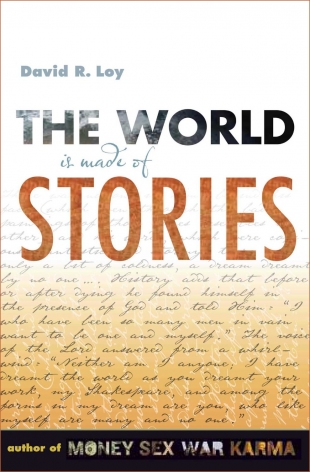David R. Loy is the Besl Professor of Ethics/Religion and Society at Cincinnati's Xavier University. He is the author of Money, Sex, War, Karma: Notes for a Buddhist Revolution. In this rich philosophical work, the author delves into the formative and significant role of stories in our lives. He begins with the well-known quote by the poet Muriel Rukeyser: "The universe is made of stories, not atoms." Every day we process hundreds if not thousands of accounts of something in forms ranging from myths, to cultural obsessions, to talk shows, to novels, to poems, to soap operas, to scientific data. According to Loy, these stories teach us what is real, what is valuable, and what is possible. We live in a storied universe and he gives us examples:
• "When Jean Genet was caught pilfering as a boy, he was told: 'You are a thief!' According to Sartre's biography, that label taught Genet who he was. It provided him with the story he learned to enact."
• "When an anorexic girl looks in a mirror and sees herself as overweight, she is viewing herself within a shared social narrative about attractiveness and sexuality. A key to healing is realizing that she can change that story and her role within it."
• "A profusion of stories is liberating yet uncomfortable, because we want to tuck ourselves securely into the True Story, the one that reveals the way things really are and what's really important."
Think about the stories you have told about your past that are keys to what drives you and gives your life meaning. Sometimes parents and grandparents tell these over and over again so that other relatives can only sigh and say: "Oh no, here we go again!" Think about the stories that animated your days as an adolescent. Here is a period of life when we share the stories presented to us by the media and those that animate our particular tribe at school. And also think about a time in your life when you desperately needed one True Story about God or religion or the only way of salvation. This kind of story provides us with a security blanket which can ward off fear and doubt while providing comfort.
This fascinating paperback is salted with thought-provoking quotations from a wide range of authors. They provide the stimulus for us to ask important questions such as: What story do I presently find most meaningful and wise? What false and toxic stories from the media or culture have slipped their way into our consciousness? What story or stories do I subscribe to about political change, power, and progress? (Loy has interesting things to say about all three.) What story have you told yourself about the way things are or could be in America today? How do the stories of Buddha and Jesus light up your life?
This quotation by poet and environmental writer Gary Snyder sums up the sweep and the clout of Loy's wide-ranging book:
"The world is made of stories. Good stories are hard to come by, and a good story you can honestly call your own is an incredible gift. These stories are part of a bigger story that connects us all."
